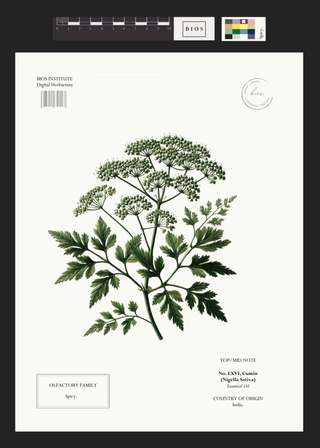

Cuminum cyminum, commonly known as cumin or yellow cumin, is native to the eastern Mediterranean region and parts of Western Asia. It is believed to have originated in the areas encompassing the eastern Mediterranean, including countries like Egypt, Syria, Turkey, and Iran. Our Cumin is sourced from India where its use in Indian cuisine and traditional medicine can be traced back to ancient times. It is believed to have been introduced to the Indian subcontinent through ancient trade routes that connected India with the Middle East and other regions. These trade routes facilitated the exchange of various goods, including spices, and played a crucial role in the spread of cumin and other spices to different parts of the world.
Cumin is an aromatic spice with a warm, earthy, and slightly spicy scent.
Cumin is a Top/Middle note found in our Spicy family. While cumin is not commonly used in perfumery, its unique aroma can evoke memories and associations with the culinary world. The scent of cumin may remind individuals of specific cuisines or dishes, bringing about a sense of comfort, familiarity, and cultural heritage.
Cumin blends well with other spicy notes, citruses, florals, and woody notes, especially scents that have a warm or spicy undertone.
Cumin is a staple spice in Indian cuisine and plays a crucial role in flavoring many dishes. It is a key ingredient in spice blends like garam masala and curry powder, and is used in a wide range of Indian recipes, including curries, dals, biryanis, and chutneys. Cumin's warm and earthy flavor is deeply ingrained in the culinary heritage of India.
Cumin is widely used in Middle Eastern cuisine, particularly in countries like Egypt, Iran, Morocco, and Turkey. It is a common ingredient in dishes like falafel, hummus, kebabs, and spice rubs for grilled meats. Cumin adds an aromatic and savory note to these dishes, enhancing their flavor and providing a distinct Middle Eastern taste.
Cumin is a fundamental spice in Mexican cooking, particularly in dishes like chili con carne, tacos, enchiladas, and salsas. It contributes a warm and smoky flavor to Mexican cuisine and is often combined with other spices like chili powder and oregano to create the characteristic taste profiles of Mexican dishes.
Cumin is an essential spice in the cuisines of North African countries such as Morocco, Tunisia, and Algeria. It is used in dishes like tagines, couscous, harissa, and ras el hanout. Cumin's aromatic and slightly bitter taste adds depth and complexity to these dishes, contributing to the rich and vibrant flavors of North African cuisine.
In addition to its culinary significance, cumin also has historical and cultural associations. It has been used in traditional medicine systems like Ayurveda and traditional Chinese medicine for its potential health benefits. Cumin seeds are believed to aid digestion, promote respiratory health, and possess antimicrobial properties. In some cultures, cumin is also associated with symbolism and folklore, often believed to bring good luck, protection, or ward off evil spirits.
Cumin
- Unit price
- /per
Please note this product format is a small vial that contains roughly 20 drops of scent concentrate. This can be purchased à la carte but is intended to be used with our Perfume Kit.
SCENT SPECIFICATIONS
Latin Name: Cuminum cyminum
Extraction Method: Steam Distilled
Country of Origin: India
All of the scents in our library our naturally derived - our collection includes essential oils, absolutes, concretes, isolates, enfleurage, macerations, oleoresins, and mixed medium naturals.
Adding product to your cart
Cuminum cyminum, commonly known as cumin or yellow cumin, is native to the eastern Mediterranean region and parts of Western Asia. It is believed to have originated in the areas encompassing the eastern Mediterranean, including countries like Egypt, Syria, Turkey, and Iran. Our Cumin is sourced from India where its use in Indian cuisine and traditional medicine can be traced back to ancient times. It is believed to have been introduced to the Indian subcontinent through ancient trade routes that connected India with the Middle East and other regions. These trade routes facilitated the exchange of various goods, including spices, and played a crucial role in the spread of cumin and other spices to different parts of the world.
Cumin is an aromatic spice with a warm, earthy, and slightly spicy scent.
Cumin is a Top/Middle note found in our Spicy family. While cumin is not commonly used in perfumery, its unique aroma can evoke memories and associations with the culinary world. The scent of cumin may remind individuals of specific cuisines or dishes, bringing about a sense of comfort, familiarity, and cultural heritage.
Cumin blends well with other spicy notes, citruses, florals, and woody notes, especially scents that have a warm or spicy undertone.
Cumin is a staple spice in Indian cuisine and plays a crucial role in flavoring many dishes. It is a key ingredient in spice blends like garam masala and curry powder, and is used in a wide range of Indian recipes, including curries, dals, biryanis, and chutneys. Cumin's warm and earthy flavor is deeply ingrained in the culinary heritage of India.
Cumin is widely used in Middle Eastern cuisine, particularly in countries like Egypt, Iran, Morocco, and Turkey. It is a common ingredient in dishes like falafel, hummus, kebabs, and spice rubs for grilled meats. Cumin adds an aromatic and savory note to these dishes, enhancing their flavor and providing a distinct Middle Eastern taste.
Cumin is a fundamental spice in Mexican cooking, particularly in dishes like chili con carne, tacos, enchiladas, and salsas. It contributes a warm and smoky flavor to Mexican cuisine and is often combined with other spices like chili powder and oregano to create the characteristic taste profiles of Mexican dishes.
Cumin is an essential spice in the cuisines of North African countries such as Morocco, Tunisia, and Algeria. It is used in dishes like tagines, couscous, harissa, and ras el hanout. Cumin's aromatic and slightly bitter taste adds depth and complexity to these dishes, contributing to the rich and vibrant flavors of North African cuisine.
In addition to its culinary significance, cumin also has historical and cultural associations. It has been used in traditional medicine systems like Ayurveda and traditional Chinese medicine for its potential health benefits. Cumin seeds are believed to aid digestion, promote respiratory health, and possess antimicrobial properties. In some cultures, cumin is also associated with symbolism and folklore, often believed to bring good luck, protection, or ward off evil spirits.
